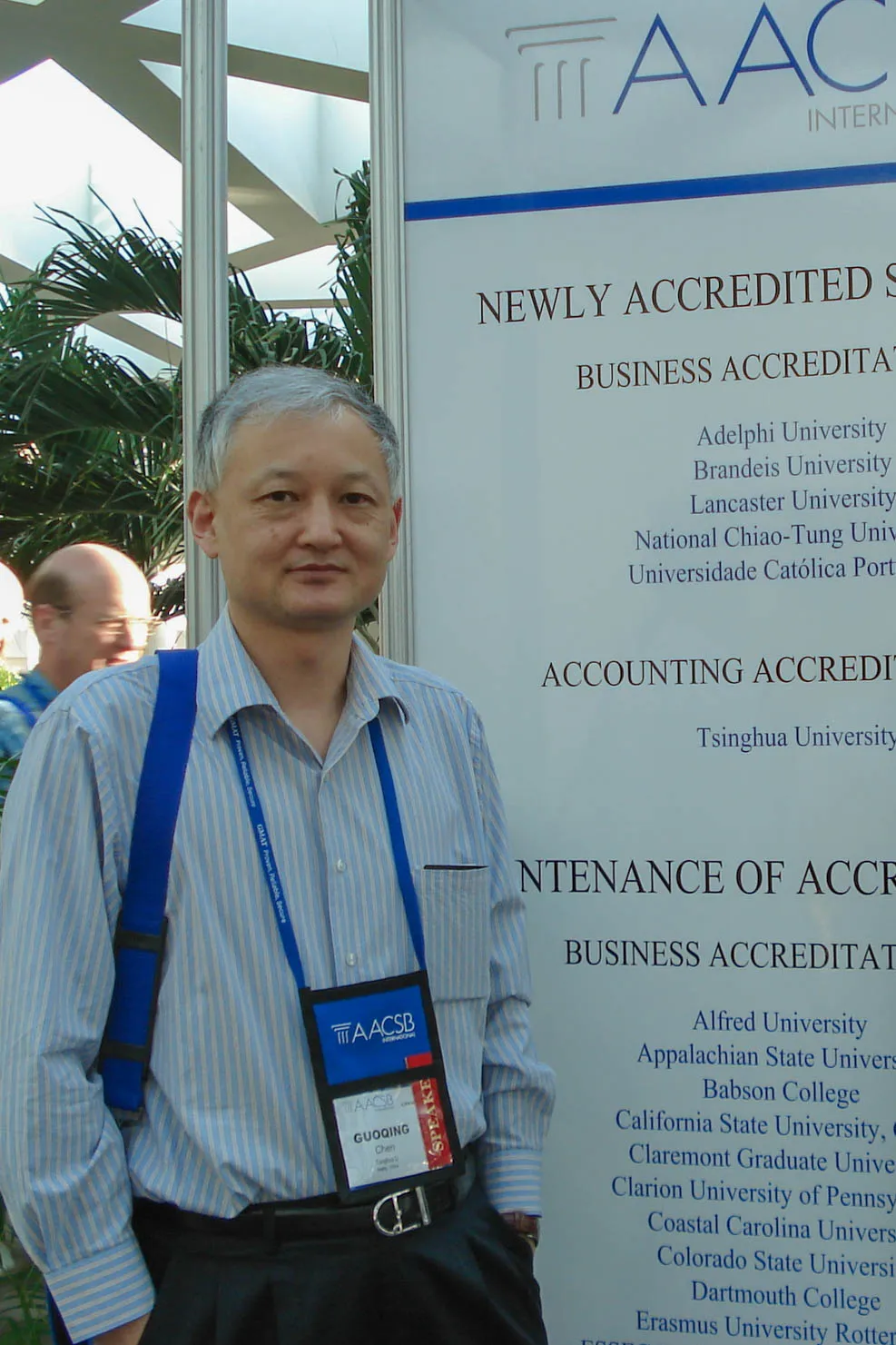CHEN Guoqing began his academic journey in 1978 at Renmin University of China, majoring in economic information management. In 1985, he was selected nationwide and started to pursue his master's and doctoral degrees at Catholic University of Leuven (KU Leuven) in Belgium. In 1994, he chose to return to China, though he had been offered positions from renowned overseas universities. Shortly in the following year, he joined Tsinghua University School of Economics and Management (Tsinghua SEM). "At that time, China's domestic market economy was just taking off, and many young individuals were excited to be pioneers," CHEN says. "The school emphasized research combining modern technology and economic management, which matched my interests, and provided a platform for my growth."
From a young faculty member and academic junior, to a groundbreaker and leader in the management disciplines, and from a recipient of the prestigious Fudan Prize for Eminent Contributions to Management Science, to Tsinghua University Distinguished Professor of Arts, Humanities, and Social Sciences, his career has been illustrious. CHEN likens academic pursuit to the four seasons: the incubation of winter, the sprouting of spring, the passion of summer, and the harvest of autumn.
At that time, CHEN observed Tsinghua SEM, freshly marking its 10th anniversary, as transitioning from its "initial development" phase to the "learning development" phase. "I believe the third decade at the school can be characterized as the 'integrated development' phase, and the fourth decade as the 'innovative development' phase. I joined the school at the convergence of the first two phases, embarking on a journey of mutual development for both the school and myself."
CHEN recalls that the "learning development" phase coincided with the nation's Project 985, aimed at elevating a number of universities to world-class status. Leveraging this momentum, Tsinghua SEM formulated a systematic development plan. The focus was twofold: one is supporting faculty members to deeply learn and exchange at renowned international business schools for enhancing their global perspectives and academic capabilities; and the other is encouraging faculty members to participate in important national research projects. Consequently, Tsinghua SEM emerged to play a leading role within the country in the quantity of national research projects undertaken, as well as in the development of faculty body and talents.
CHEN Guoqing, deeply committed to academic research and disciplinary development, has made significant contributions to management fields. In 2005, he organized with other scholars to establish the China Chapter of Association for Information Systems (i.e., China Association for Information Systems, CNAIS) and served as its inaugural president for eight years. Under his leadership, CNAIS grew into the most influential academic community of China's information systems field. Meanwhile, he has served for many years as chairman of China Ministry of Education's Educational Steering Committee for the Management Science and Engineering Disciplines. In this role, he has actively promoted the development of related disciplines in China (such as information management and information systems, big data management and applications, etc.) and have propelled nationwide enhancements in teaching standards, curriculum designs, and faculty advancements.
CHEN's research endeavors in discovery of uncertain knowledge for business intelligence, and in big data driven managerial decision-making for information systems, which has garnered him acclaim within the academic sphere, both nationally and globally. In 2009, he was bestowed with the IFSA Fellow award by the International Fuzzy Systems Association, becoming the second scholar from the Chinese mainland to achieve this distinction. In 2019, he was awarded the AIS Fellow by the Association for Information Systems, becoming the first scholar from the Chinese mainland to receive this prestigious recognition.
"My research centers around data, which continually brings new insights to me," CHEN says. Whether in research or teaching, he maintains a steadfast focus on data and information. His dedication to extreme long-term thinking enables him to navigate through evolving cycles. His research accomplishments are heightened significance nowadays in the era of big data and intelligence.
Since 2015, CHEN Guoqing has led the steering expert panel for the grand research plan of the National Natural Science Foundation of China (NSFC) on Big Data Driven Management and Decision Sciences (i.e., big data grand research plan, in brief). He oversees the plan's overall design, project layout, and research guidance. "Grand research plan" resides in the highest-scale level of NSFC's regular research category, and big data grand research plan is the sole one that NSFC has had on the theme of big data. It brings together numerous outstanding teams with interdisciplinary strengths in management, information, mathematics, and medicine, so as to address critical managerial decision-making issues of business, finance, healthcare, and public administration.
"Theory must be intertwined with practice. To effectively convey China's latest advancements to the world, it necessitates innovation and world-class contributions," he says. For instance, in the research on big data driven managerial decision-making, what defines a "big data problem"? What methodological paradigms are proper for exploration? How does decision-making in the context of big data differ from traditional approaches? What pivotal issues does this big data grand research plan seek to address? These questions, previously unexplained, encapsulate the goals he hopes to achieve.

Professor CHEN Guoqing lectures on big data at the Humanities Tsinghua Forum on June 10, 2019.
Over the years, CHEN Guoqing has diligently tackled a series of challenges in academia, crafting management theories and methods relevant to both industry and society. Moreover, through his leading role in national research initiatives including big data grand research plan and other NSFC major projects, he has also helped nurture a group of young faculty members at the school. This effort has helped fortify Tsinghua SEM's talent foundation for its high-quality development.
From 1999, CHEN started to serve as associate dean at the school. During this period, under the leadership of Dean ZHU Rongji and Dean ZHAO Chunjun, the school aimed itself to meet international standards, steadily enhancing its openness, international dialogue, and collaboration.
"Especially after China's accession to the WTO, there has been a growing trend of 'bringing in' and 'going global.' It's imperative to engage in academic dialogue with the international community and tell the story of Chinese economics and management globally. It is also crucial to have academic methodologies compatible with the international ones, so that Tsinghua SEM's voice could resonate worldwide," CHEN Guoqing says.
From 2001 to 2009, CHEN Guoqing assumed the role of executive associate dean of the school, proactively advancing and in charge of the school's participation in the accreditation process for management education by the Association to Advance Collegiate Schools of Business (AACSB). "Quality accreditation demands a comprehensive effort where teaching, research, student development, alumni engagement, and other facets must all meet exceptionally high criteria. The school's education should align with the highest international standards," he says.

CHEN Guoqing at the 2007 Annual Meeting of AACSB Accreditation
To attain accreditation, the school embarked on a series of reforms and constantly improved until it could meet the standards. In 2007 and 2008, the school achieved the significant milestones of AACSB accreditation for management education, of AACSB accreditation for accounting education, and of EQUIS accreditation from the European Foundation for Management Development (EFMD), becoming the first business school in the Chinese mainland to receive both AACSB and EQUIS accreditations, the two foremost global accreditations in management education.
CHEN said becoming accredited serves three purposes. Firstly, it established a dialogue platform between the school and international economics and management education, fostering mutual trust and recognition in research and student development. Secondly, it provided a foundation for sustainable growth, as re-accreditation cycles occur every three to five years, leveraging external stimuli to drive the school's continuous long-term advancement. Thirdly, it showcased the developmental prowess of the school's educational programs to the world, with the programs' global rankings consistently on the rise.
As the school transitions into its "innovative development" phase, against the backdrop of China's rapid economic growth, there's a growing spotlight on Chinese enterprises, cases, and standards. Consequently, there's an urgent demand within the academic community for original research delving into these distinctive "Chinese phenomena."
As someone who has long overseen the school's research endeavors, CHEN says, "We need to anchor our initiatives in the context of China's development while considering theoretical rigor from a global perspective. As we enter a phase of innovative development, our goal is to tackle new challenges through intellectual knowledge and social contributions. On one hand, we will proceed in line with international advancement of academic pursuit; on the other hand, we will focus more on Chinese issues. This is the current mission in research for individual scholars as well as for the school at large ."
It's rewarding that, thanks to the dedication of generations at Tsinghua SEM, the faculty conducts research rooted in China with unique contexts. They aim to showcase China's perspective on the global academic platform with top-tier research outcomes and effectively tell China's story. Concurrently, they actively participate in industry and policy studies, playing a distinctive and important role in providing insights and advice for China's economic and social progress.
With years of experience at the school, CHEN describes its culture in this way: "When I was a junior faculty member, many senior scholars at the school helped me wholeheartedly. They cultivate an academic quality with integrity as part of the school's culture." Likewise, he endeavors to impart this to younger faculty and students.
CHEN Guoqing frequently motivates and helps young faculty to engage in state-of-art research, and to increase the impact of their studies. He also closely mentors and helps his students for their growth and development.
He says that although our goals may differ and the landscapes on the way diverge, "short cuts are exceptional, long journeys are usual." Both the pursuit of scholarship and personal development constitute integral parts of a journey forward.
CHEN Guoqing often encourages his students with this message: "Every success is born from consistent and incremental efforts. It's crucial to grasp the zeitgeist and its trajectory, uphold a mindset of excellence, and embody the virtues of simplicity, modesty, idealism, and patriotism. Make choices that hold the values amid possible distractions and clamor.”
"As Tsinghua SEM celebrates its 40th anniversary, I extend my best wishes for the school's continued success in advancing knowledge and cultivating leaders for China and the world," CHEN says, "We all strive to proceed towards this shared mission for a brighter future."









